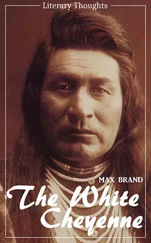"I rather think that Herbert Maxwell would have something to say about that."
Mrs. Cole surveyed him archly, meditating a convincing retort, when suddenly a new group of riders appeared over the crest of an intervening hill. "Here they are!" she cried with a gusto which proclaimed that the opportunity for subtle confabulation on the point at issue was at an end.
The newcomers, all ardent hunting spirits—Mr. and Mrs. Andrew Cunningham, Miss Peggy Blake, Miss Lydia Arnold, Guy Perry and Herbert Maxwell—came speeding forward at a brisk gallop. Mrs. Cunningham—May Cunningham—was a short, dumpy woman, amiable and popular, but hard featured, as though she had burned the candle in social comings and goings in her youth, which indeed was the case. But since her marriage she had by way of settling down fixed her energies on cross-country riding, and was familiarly known as the mother of the hunt. She had an excellent seat. She and her husband, a burly sportsman whose ruling passion was to reduce his weight below two hundred pounds, and whose predilection for gaudy effects in waistcoats and stocks always pushed the prevailing fashion hard, were prime movers in the Westfield set. They had no children, and, as Mrs. Cole once said, it sometimes seemed as though the hounds took the place of them.
Miss Peggy Blake was a breezy Amazon, comely, long-limbed and enthusiastic, of many adjectives but simple soul, whose hair was apt to tumble down at inopportune moments, but who stuck at nothing which promised fresh physical exhilaration. Guy Perry, a young broker who had made a fortune in copper stocks, was one of her devoted swains. But dashingly as she rode, her carriage lacked Lydia Arnold's distinction and witchery. Indeed, that slight, dainty young person seemed a part of the animal, so gracefully and jauntily did she follow the movements of her rangy, spirited thoroughbred. When Gerald Marcy exclaimed fervently, "By Jove, but she rides well!" no one of the awaiting group was doubtful as to whom he meant.
Keeping as close to his Dulcinea as he could, but not quite abreast, came Herbert Maxwell, a rather lumbering equestrian. Fashion had led him, the previous season, as a young man with great possessions, to follow the hounds, but sedately, as became a somewhat sober novice. Love now spurred him to take the highest stone walls, and for the purpose he had bought a couple of famous hunters. He had long ago dismissed both fear and caution, and had eyes only for the nape of Miss Arnold's neck as they sped over hill and dale. Twice in the last six weeks he had come a cropper, as the phrase is, and been cut up a bit, but he still rode valiantly, bent on running the risk of a final tumble which would break not his ribs but his heart. In every-day life he appeared large and above the average height, with reddish-brown hair and eyebrows and a somewhat grave countenance—rather a nondescript young man, but entirely unobjectionable; the sort of personality which, as Lydia's friends were saying, a clever woman could mould into a solid if not ornamental social pillar.
For Herbert Maxwell was a new man. That is, the parents of the members of the Westfield Hunt Club remembered his father as a dealer in furniture, selling goods in his own store, a red-visaged round-faced, stubby looking citizen with a huge standing collar gaping at the front. Though he had grown rich in the process, settled in the fashionable quarter of the city and sent his boy to college in order to make desirable friends and get a good education, it could not be denied that he smelt of varnish metaphorically if not actually, and that Herbert was, so to speak, on the defensive from a social point of view. Everybody's eye was on him to see that he did not make some "break," and inasmuch as he was commonly, if patronizingly, spoken of as "a very decent sort of chap," it may be taken for granted that he had managed to escape serious criticism. His sober manner was partly to be accounted for by his determination to keep himself well in hand, which had been formed ten years previous, during his Freshman year, when one of his classmates, to the manner born, informed him in a moment of frankness that he was too loud-mouthed for success.
This had been the turning-point in his career; he had been toning down ever since; he had been cultivating reserve, checking all temptations toward extravagance of speech, deportment or dress, and, in short, had become convincingly repressed—that is, up to the hour of his infatuation for Lydia Arnold. Since then he had let himself go, yet not indecorously, and with due regard to the proprieties. All the world loves a lover, and to the Westfield Hunt Club Herbert Maxwell's kicking over the bars of colorless conventionality appeared both pardonable and refreshing, especially as it was recognized that the manifestations of his ardor, though unmistakable, had not been lacking in taste. The sternest censors of society had not the heart to sneer at the possessor of four millions because the entertainments which he gave in his lady love's honor were more sumptuous than the occasion demanded, and that in his solicitude to keep up with her on the hunting field he was an easy victim to the horse-dealers. Before the bar of nice judgment it was tacitly admitted that he appeared to better advantage than if he had ambled after his goddess with the lacklustre indifference which some of his betters were apt to affect. It takes one to the manner born to be listless in love and yet prevail; and so it was that Maxwell's reversion to breakneck manners had given a pleasant thrill to this fastidious colony.
Gay greetings and felicitations on the beauty of the day for hunting purposes were exchanged between the new-comers and their friends. The men in their red coats had a word of gallantry or chaff for every woman. New equestrians appeared approaching from diverse directions, while suddenly from the kennels a few rods distant issued a barking, snuffing pack of eager hounds, conducted by Kenneth Post, the master, whose expansive high white stock and shining black leather boots proclaimed that he took his functions seriously. This was a red-letter day for him, as he had invited the hunt to breakfast with him at the club-house after the run.
Lydia, on her arrival, had guided her thoroughbred to the other side of Mrs. Cole so deftly that her admirer was shut out from immediate pursuit. At a glance from her the two women's heads bent close together in scrutiny of some disarrangement in her riding-habit.
"Fanny," she whispered, "I've done it."
"Lydia! When did it happen?"
"Last evening. I've given him permission to announce it at the breakfast."
"My dear, I'm just thrilled. You've kept us all guessing."
"I've heard that the betting was even," answered Lydia with dry complacency. The intimation that she had kept the world in the dark was evidently agreeable. "I wished you to know first of all."
"That was lovely of you. And how clever to escape the bore of writing all those hateful notes! That was just like you, Lydia."
"I know a girl who wrote two hundred, and the day they were ready to be sent out changed her mind. I don't wish to run the risk. Here comes Mr. Marcy."
Fannie Cole gave her hand an ecstatic squeeze and they lifted their heads to meet the common enemy, man. It was time to start, and he was solicitous lest something were wrong with Miss Arnold's saddle girths.
"Beauty in distress?" he murmured with a tug at his mustache. Marcy had his commonplace saws, like most of us.
Mrs. Cole was opening her mouth to reassure him on that score when she was forestalled by Lydia.
"That's a question, Mr. Marcy, which can be more easily answered a year or two hence."
Marcy bowed low in his saddle. "At your pleasure, of course. I did not come to pry." At his best Marcy had quick perceptions and could put two and two together. He was assisted to the divination that something was in the wind by catching sight at the moment of Herbert Maxwell's countenance. That worthy had been blocked in his progress by pretty Mrs. Baxter, who, having resented his attempt to squeeze past her by the following remark, had barred his way with her horse's flank.
Читать дальше












